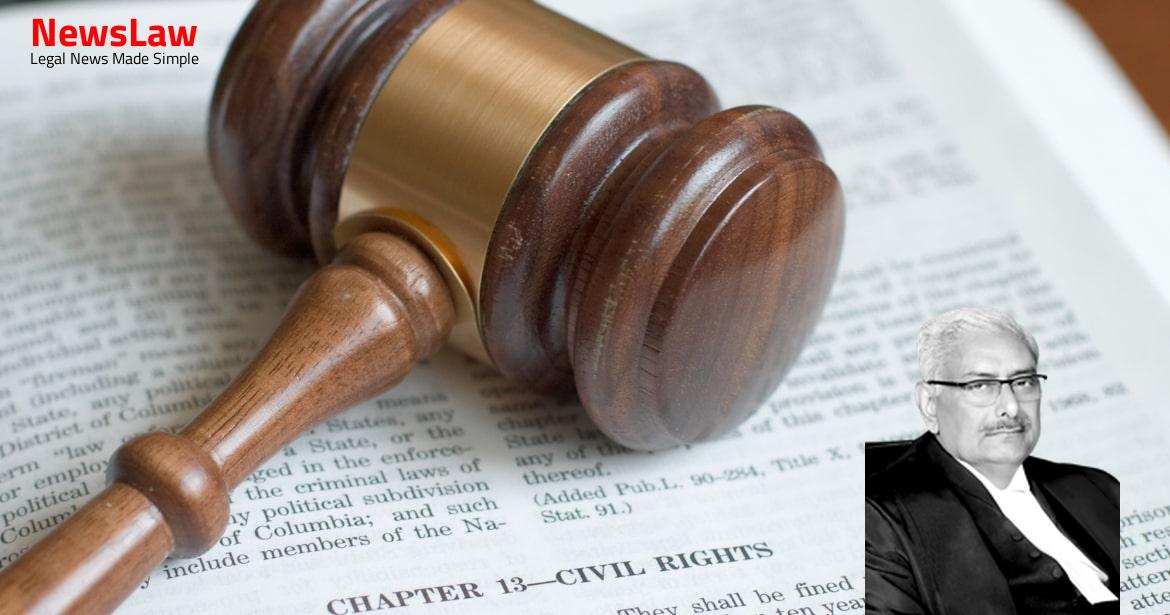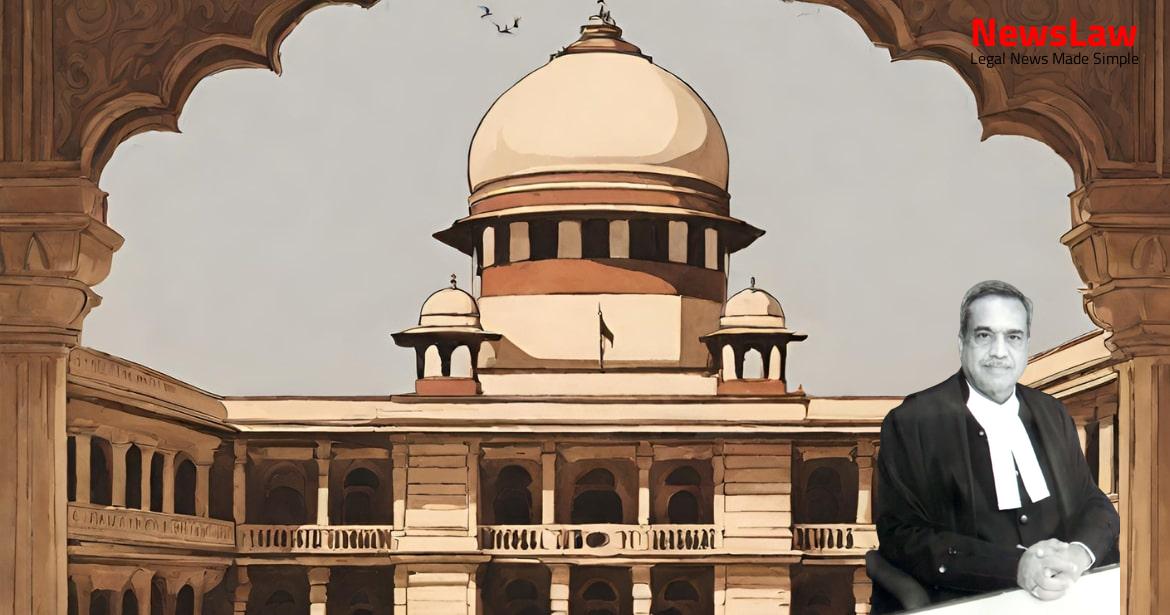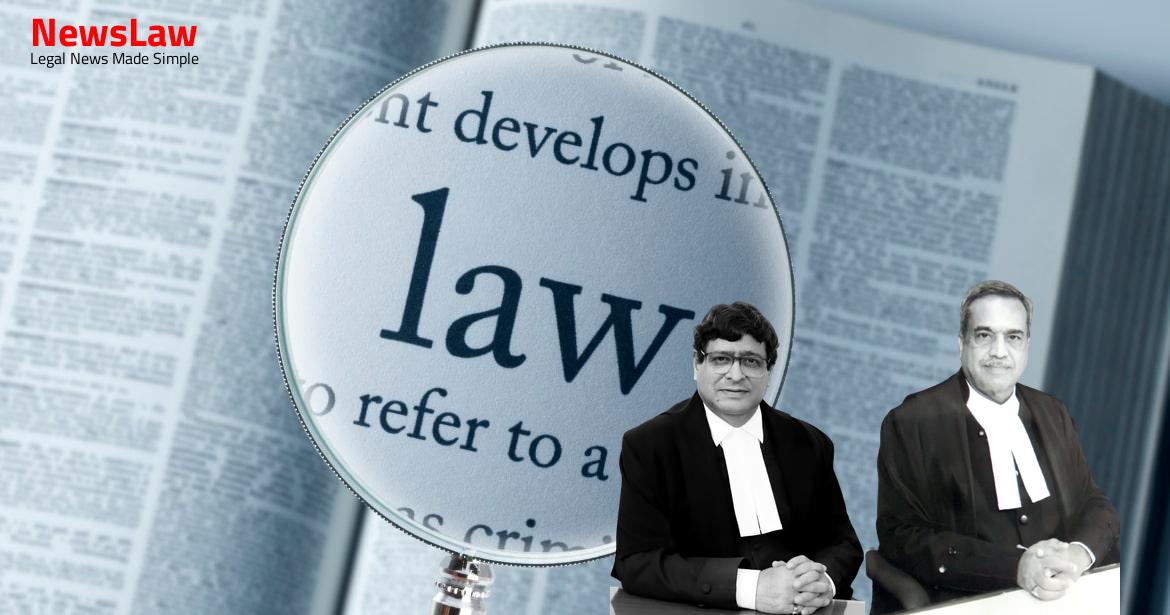In a significant judicial development, a court analyzed the conversion of a death penalty to life imprisonment in a landmark case. The focus was on the legal intricacies surrounding the decision, delving into mitigating factors and procedural considerations. This thorough examination sheds light on the nuanced approach courts take in capital punishment cases, emphasizing the importance of fair and just sentencing practices.
Facts
- The accused was working as a laborer in the house of Shivlal.
- When three minor children went missing, Shivlal lodged a Missing Person Report at the police station.
- The accused made a call indicating his location 60 kms away.
- The accused was found and brought to the police station after the dead bodies were sent for post-mortem.
- During investigation, call details of the accused’s mobile phone were examined.
- The accused was arrested based on a memorandum dated 13.02.2011.
- It was revealed that the accused abducted and killed the three minors as revenge for his wife eloping with Shivlal’s brother.
- The Investigating Officer filed a charge-sheet against the accused for the offenses under Section 302 and Section 364 IPC.
- The accused denied all allegations against him.
- At the instance of the accused, the dead bodies of the three minors were recovered from a site in Karaihapara.
- The accusation against the accused initially included offenses under Sections 363 and 364 IPC.
- Accused did not examine any witness in support of his defense.
- Trial Court held accused guilty for offenses punishable under Sections 302 and 364 IPC.
- Trial Court awarded death sentence after considering aggravating and mitigating circumstances.
- Death sentence was confirmed by the High Court in Criminal Appeal No. 550 of 2013 and Criminal Reference No. 05 of 2013.
- Accused, feeling aggrieved, has preferred the present appeal against the judgment and order of conviction.
Also Read: Court’s Analysis on Interim Order for Appointing Contractual Employees
Issue
- The question before the Court is whether the death sentence is warranted in the given facts and circumstances of the case.
Also Read: Analysis of Promissory Estoppel in Government Policy Change
Arguments
- The appellant’s counsel argues that the young age of the appellant at the time of the offense was not considered as a mitigating circumstance by the Trial Court and the High Court.
- The appellant’s counsel contests the reliability of the evidence provided by witness P.W.8, arguing that it cannot be relied upon as last seen evidence.
- The appellant’s counsel challenges the convictions based on call details and alleged confessions, highlighting material errors by the Trial Court and the High Court.
- The counsel argues that the recovery of the deceased minors’ bodies from an open area, not in the exclusive knowledge of the accused, cannot be the sole basis for conviction.
- The appellant’s counsel disputes the last seen together evidence, pointing out contradictions in the testimonies of key witnesses.
- The emotional disturbance of the appellant at the time of the offense is presented as a relevant consideration against the death sentence.
- Various inconsistencies and discrepancies in witness testimonies and evidence presentation are highlighted by the appellant’s counsel to challenge the conviction.
- The appellant’s counsel argues that the reliance on extra-judicial confessions and call details is not admissible or sufficient for conviction.
- The failure to provide a separate hearing for the sentencing process is raised as a procedural error by the Trial Court, impacting the decision to award the death penalty.
- The accused’s statement under Section 313 Cr.P.C. is a total denial.
- The case is deemed fit for a death sentence, falling into the rarest of rare cases.
- The accused cannot be acquitted based on the above grounds.
- Considering the severity of the crime where the accused abducted and killed three minor children, no sympathy should be shown.
- The judgment and order on sentence were not interfered with as the accused had the opportunity to be heard.
- Elaborate submissions were made by the accused’s advocate on the sentence, including on the death sentence.
- No prejudice was caused to the accused as sufficient opportunity was given for the sentence.
- The death sentence should be confirmed, and the appeal dismissed.
Also Read: Court’s Legal Analysis in Tax Law Challenge
Analysis
- The accused was not present in his house at the time of the incident
- Phone calls made to the accused on the night of 11.02.2011 were proved by the prosecution
- The accused failed to provide any explanation for the phone calls in his statement under Section 313 Cr.P.C.
- Non-examination of the officer of the mobile company was not fatal to the prosecution’s case
- The prosecution proved that the accused was last seen with the deceased minors before they went missing
- The accused was found hiding in a relative’s house after the incident
- Dead bodies were recovered from the locations shown by the accused after his arrest
- The Trial Court’s handling of both conviction and sentencing on the same day did not vitiate the sentencing
- Mere brutality of the murder does not always lead to the imposition of death penalty
- The Trial Court provided the accused with a real and effective opportunity to plead his case with respect to sentencing
- Mitigating factors such as extreme emotional disturbance were considered in sentencing
- The time taken by the courts until the final verdict is pronounced cannot be a ground for commuting the death sentence to life imprisonment.
- It has been settled in Triveniben v. State of Gujarat that delays in judicial proceedings do not warrant commutation of death sentences.
- Judicial matters involving capital punishment are expected to be given priority for expeditious disposal.
- The accused should not suffer mental torture of uncertainty while the case is pending before any court.
- Mitigating circumstances such as the probability of reformation and rehabilitation of the accused should be considered in deciding on a death sentence.
- The core of a criminal case lies in its unique facts, which differ from case to case.
- The decision to impose the death penalty must consider guiding principles in each case’s specific facts and circumstances.
- The failure to conduct a pre-sentence hearing on a separate date may not necessarily invalidate the trial if the accused had sufficient time to present relevant material.
- The court has discretion in imposing the death penalty based on rarest of the rare cases and societal interest.
- Procedural improprieties such as not having a separate hearing for conviction and sentencing can be considered but do not invalidate the trial if sufficient opportunity was provided to the accused.
- When deciding on sentencing, the balance between aggravating and mitigating circumstances must be carefully weighed as per relevant case law.
- Mitigating circumstances in the present case considered along with those observed in the Bachan Singh case.
- Accused was under extreme mental disturbance for reasons mentioned.
- Considering the peculiar facts and circumstances of the case, death penalty is not warranted.
- Death penalty is converted to life imprisonment.
- The present appeal succeeds in part.
Decision
- Partly allowed the appeal
- Judgment and order of the Trial Court and High Court convicting the accused for offences under Sections 302 and 364 IPC is confirmed
- Death sentence converted to life imprisonment
- Life imprisonment means till the end of life
- No remission allowed until the accused completes 25 years of imprisonment
Case Title: MANOJ SURYAVANSHI Vs. STATE OF CHHATISGARH (2020 INSC 275)
Case Number: Crl.A. No.-000388-000388 / 2020



